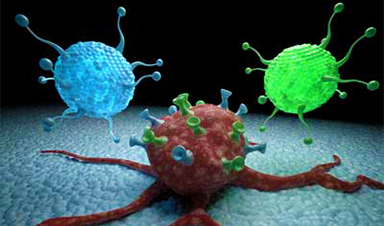Globally, cancer is the second leading cause of death, also because the efficiency of chemotherapeutics is inadequate due to poor delivery to the tumor. NIM scientist Prof Olivia Merkel and her team develop targeted nanocarrier systems to increase the delivery rates of therapeutic formulations and their specific uptake into the target cells.
In the treatment of cancer, there are still several limitations. Especially the delivery of sufficient amounts of active chemotherapeutic drug is difficult. After the conventional intravenous administration, the therapeutic formulation faces some hurdles before reaching the target site. In most cases, the blood circulation time of the active compound is rather short, and a substantial amount of the remaining active drug accumulates in non-target tissues and leads to the known unpleasant and unwanted side-effects in patients.
Therefore, the group of Professor Olivia Merkel focuses on the development of stable and targeted nanocarrier formulations and alternative administration routes. One approach is the targeting of specific sugar receptors expressed on several cancer cells, the mannose and mannose-6-phosphate receptors. The new publication in Advanced Healthcare Materials (“Mannose and Mannose-6-Phosphate Receptor–Targeted Drug Delivery Systems and Their Application in Cancer Therapy”) provides a nice overview of the field and presents first results of a new approach tested in the Merkel Lab.
Image Credit: C Hohmann
News This Week
Repurposed drugs could calm the immune system’s response to nanomedicine
An international study led by researchers at the University of Colorado Anschutz Medical Campus has identified a promising strategy to enhance the safety of nanomedicines, advanced therapies often used in cancer and vaccine treatments, [...]
Nano-Enhanced Hydrogel Strategies for Cartilage Repair
A recent article in Engineering describes the development of a protein-based nanocomposite hydrogel designed to deliver two therapeutic agents—dexamethasone (Dex) and kartogenin (KGN)—to support cartilage repair. The hydrogel is engineered to modulate immune responses and promote [...]
New Cancer Drug Blocks Tumors Without Debilitating Side Effects
A new drug targets RAS-PI3Kα pathways without harmful side effects. It was developed using high-performance computing and AI. A new cancer drug candidate, developed through a collaboration between Lawrence Livermore National Laboratory (LLNL), BridgeBio Oncology [...]
Scientists Are Pretty Close to Replicating the First Thing That Ever Lived
For 400 million years, a leading hypothesis claims, Earth was an “RNA World,” meaning that life must’ve first replicated from RNA before the arrival of proteins and DNA. Unfortunately, scientists have failed to find [...]
Why ‘Peniaphobia’ Is Exploding Among Young People (And Why We Should Be Concerned)
An insidious illness is taking hold among a growing proportion of young people. Little known to the general public, peniaphobia—the fear of becoming poor—is gaining ground among teens and young adults. Discover the causes [...]
Team finds flawed data in recent study relevant to coronavirus antiviral development
The COVID pandemic illustrated how urgently we need antiviral medications capable of treating coronavirus infections. To aid this effort, researchers quickly homed in on part of SARS-CoV-2's molecular structure known as the NiRAN domain—an [...]
Drug-Coated Neural Implants Reduce Immune Rejection
Summary: A new study shows that coating neural prosthetic implants with the anti-inflammatory drug dexamethasone helps reduce the body’s immune response and scar tissue formation. This strategy enhances the long-term performance and stability of electrodes [...]
Scientists discover cancer-fighting bacteria that ‘soak up’ forever chemicals in the body
A family of healthy bacteria may help 'soak up' toxic forever chemicals in the body, warding off their cancerous effects. Forever chemicals, also known as PFAS (per- and polyfluoroalkyl substances), are toxic chemicals that [...]














Leave A Comment